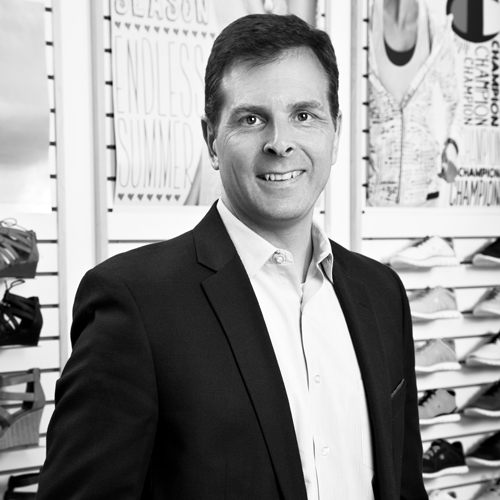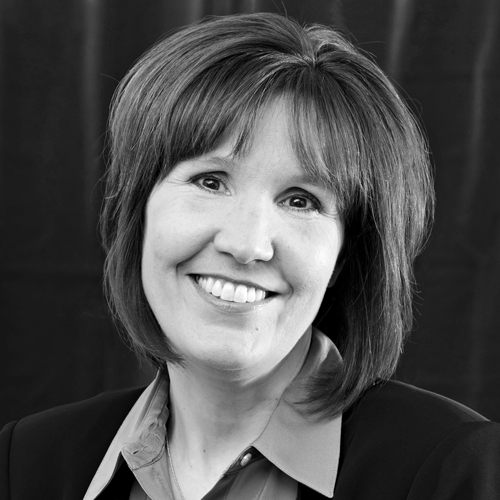Michael Schwindle has a varied résumé, but there’s one constant throughout his career—a reliance on data.
With his current role as chief financial officer of Payless ShoeSource, Schwindle takes executive strategy to the next level, working with data to understand the business and create an action plan for the Kansas-based company.

As a numbers guy, Schwindle has focused on data throughout his career, whether it be most recently at the gourmet gifts company, Harry & David, or for women’s fashion company, Limited Brands, in the 1990s. “In a consumer-facing business, whatever is happening economically you see play out in real time,” Schwindle says.
To illustrate his point, Schwindle reflects on the 2008 economic recession. At the time, he was working at Guitar Center’s online business—and although the online retail world fared better than traditional businesses at that time—it still experienced the economic turn. He remembers watching the numbers shift and wondering what was really playing out with customers. He wondered when would be the tipping point. “We didn’t fully recognize the recession until later, but in retrospect, it was all playing out in full, Technicolor detail,” Schwindle admits.
With modern technology, businesses have more access to consumer information than ever before. But Schwindle recalls the days when data wasn’t as easy to come by. He was working at Limited Brands, when it rolled out a one-terabyte customer database for Victoria’s Secret. Schwindle says it was amazing to see what was actually happening at the transaction level in large scale. “We always had known that product A and B were both selling, but we could now see when they were actually selling at the same time,” he explains.
The analysis often told different stories than what the company had previously assumed, Schwindle adds. “You can then start to understand what is really, really going on at an individual level—at the point of consumer decision,” he says.
One big difference between online purchasing and a traditional brick-and-mortar business is that online transactions allow a business to know “every single customer 100 percent,” according to Schwindle. Unless a customer is using a loyalty card or similar identification, the traditional brick-and-mortar retailer has a far more difficult time understanding individual customer’s preferences. He admits that traditional retailers are “often blind” to the details.
At his core, Schwindle is a data man. “A mentor of mine told me early in my career that numbers are a function of activity,” he says. “It is not that data is the end-all, it is that data enables us to understand what is really happening.” Schwindle believes in the importance of using analytics to gauge consumer reactions both “upstream and downstream.” While this might sound complex, he is adamant about one thing: the principles of business are simple.
“Companies often struggle with the simple things—things that if you passed a multiple choice test around, people would get an A on it,” Schwindle says. “The question is not, ‘Do we know what we need to do?’ The question is, ‘Do we actually do it? Do we have the discipline to do it on a daily basis?’” Disciplined data gathering, monitoring, and response reinforces that discipline.
“I think that consumer businesses see the obvious importance of leveraging data to make recommendations and predict outcomes. So many of the initial big-data examples of the impact a data scientist can have on finding trends, correlations, and predictions that translate into sales are in the retail industry. What I now see are that more traditional business-to-business enterprises are leveraging the very same techniques to do much more predictive forecasting and targeted selling. For so many years, enterprises have spent more time focusing on data quality and not on leveraging the directional trends and opportunities that the data can provide to drive growth.” —Guest Editor Julie Cullivan, SVP of Business Operations and CIO at FIreEye
Schwindle notes that data can be a boon to consumers as well. Customers don’t always have to carry receipts today or worry about returns. When a company is able to tailor their programs and responses to individual clients, Schwindle believes it results in a better customer experience. Data allows the business to understand their customers, and in the end, serve them better.
As a CFO, Schwindle also believes in seeing what goes on behind the scenes. He wants to make sure that data correlates with the situation on the ground. With experience in both retail operations and supply chain, he understands the importance of actually seeing the operations versus just looking at spreadsheets.
He recently traveled to Asia to meet with some of Payless’ suppliers and to observe its production lines. During the visit, Schwindle recalls that an employee approached him and said, “The CFO has never been out here.” He was shocked. “It is counter to the point,” Schwindle says. “If numbers are a function of activity, I don’t know why the CFO wouldn’t be out there.”
Another technique that Schwindle uses to correlate data to activity is to visit retail stores unannounced. Although he says there is a time and place for announced visits, he prefers unannounced visits. “You need to stand in a store and experience it just like the customer,” Schwindle says. “I want to see it exactly the same way a customer sees it. What happens in the trenches is not always exactly what it should be.”
He has found that some of his best employees are the ones who have operational experience in addition to financial acumen. They understand that a spreadsheet could be very different from the reality of business, and that as a finance person in a company, they need to understand that discrepancy.
As a father of six, Schwindle isn’t sure if having kids prepared him for business or if the boardroom prepared him for children. However, the executive does admit one thing: he finds himself doing and saying the same things at home and at work. Two of his children have pursued business-related careers.
The proud dad recalls giving them advice, explaining that there is no game plan if they want to go all the way to the top in their careers. “There is no CEO degree, no CEO school,” Schwindle says. “CEOs come from all walks of life. Finance is the way through which I lead today, but leadership is still leadership regardless of your specialty.” ×

